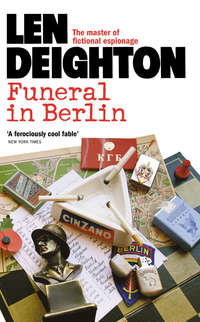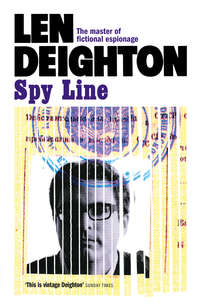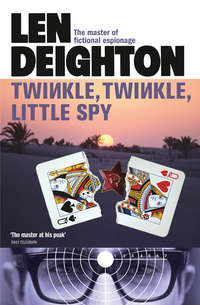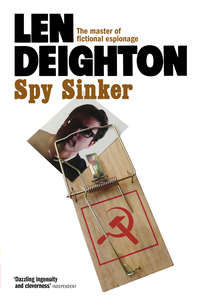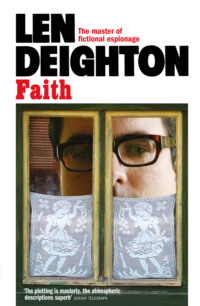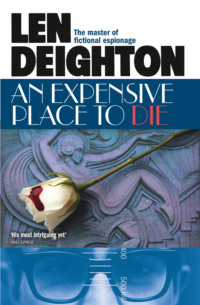
Полная версия
Horse Under Water
‘I’m flattered,’ I said.
‘Perhaps,’ said Dawlish, who considered illegal talent a dubious virtue; ‘but Treasury may have second thoughts, if they know how strongly you are against it.’
‘Don’t sell tickets on the strength of it,’ I told him. ‘What F.S.T.fn3 will pass up a chance of saving perhaps a million pounds sterling? He probably has the College of Heralds designing a coat of arms already.’
I was right. Within ten days I had a letter telling me to report to the R.N. Instructional Diving School (Shallow Dive Course No. 549) at H.M.S. Vernon. The F.S.T. was going to get an earldom and I would get an Admiralty diving certificate. As Dawlish said when I complained, ‘But you are the obvious choice, old boy.’ He inscribed the numeral ‘one’ on his notepad and said, ‘One, Lisbon 1940, many contacts, you speak a bit of the lingo. Two,’ he wrote ‘two’, ‘currency expert. Three,’ he wrote ‘three’, ‘you were in on the first contacts with the V.N.V. in Morocco last month.’
‘But do I have to go on this frogman course?’ I asked. ‘It will be wet and cold and it’ll all take place in the early hours of the morning.’
‘Physical comfort is just a state of mind, my boy, it will make you fighting fit; and besides,’ Dawlish leaned forward confidentially, ‘you’ll be in charge, you know, and you don’t want these blighters nipping below for a crafty smoke.’ Dawlish then uttered a curious polyphonic sound, rather high-pitched at first, ending in a vibrating palate and terminated by the distribution of tobacco ash throughout the room. I stared incredulously; Dawlish had laughed.
3 Undersea need
There is a point on the A3 near Cosham at which the whole of Portsmouth Harbour comes suddenly into view. This expanse of inland water is a vast grey triangle pointing to the Solent. The edges are sharp serrated patterns of docks, jetties and hards enclosing the colourless water.
A penetrating drizzle had been leaking through the low cloud since I had joined the A3 at Kingston Vale about 6.45 a.m. Window display men were junking polystyrene Xmas trees and ordering gambolling lambs. On their way to work people were sneaking a look at shop windows to see how much their relatives had paid for the presents they had received.
The snow had been around a long time. Layer upon layer had crystallized and hardened into abstract shapes. Now it sat like a delinquent child glaring at passers-by and daring them to try moving it. The ground had absorbed so much cold that rain made a slippery layer on the ice. I slowed as crowds of factory and dockyard workers swarmed across the streets. I turned into the red-brick gate of H.M.S. Vernon. A rating stood there in oilskins that gleamed like patent leather. He waved me to a halt. I walked to the porch where half a dozen sailors in damp saggy raincoats sat huddled together, hands in pockets. From the brittle Tannoy came a message for the duty watch. I knocked at the counter.
A young rating looked up from the assorted parts of a bicycle bell that lay before him on the table.
‘Can I help you sir?’
‘Instructional Diving Section,’ I said.
He asked the operator for a number and sat, eye-glazed, waiting to be connected. On the notice board I read about the Q.M. of the watch being responsible for boilers when there were men in cells. Under it hung a copper bugle with highly polished dents. I signed into the visitors’ ledger ‘Time of arrival 08.05’, a drip of rain spattered on to the page. Inside the office were the highly polished lino and blancoed belts that go with military police systems everywhere in the world. A two-badge seaman took over the phone and clobbered the receiver rest a few times. A P.O. emerged, holding a brown enamel teapot. He looked at my Admiralty authority.
‘That’s all right – take him over to Diving.’ He disappeared still holding the teapot in both hands.
The rain hammered the concrete roadways and paths and large freshly painted ships’ figureheads dribbled pensively. The Instructional Diving Section was a barn-like building that echoed to the noise of metal drums being moved. Behind a wire screen was a hardboard counter and a muscular rating.
‘Course 549?’ he asked.
‘Yes,’ I said. He eyed my civilian raincoat doubtfully. Over the Tannoy came the clang of one bell in the forenoon watch. A tall one-stripe hooky exchanged a Gauloise cigarette for half a cup of dark brown tea and I warmed my hands on the enamel sides of the mug. I knew it would all take place in the early hours of the morning.
The grey winter light and wet fog crept through the tiny windows and illuminated the rigid lines of school desks, engraved with hearts, patterns, and initials. I looked around the classroom. At the other desks were quiet, smooth-faced N.O.s with carefully dirtied gold stripes wrapped around brushed blue worsted. They talked quietly together in a well-bred clubby sort of way. I found my cigarettes and lit up. Behind me someone was saying ‘… and the bedrooms will be all G-Plan too …’
‘Here we go,’ someone else said. The door clicked open. With a smooth legerdemain perfected amid the tyranny of gunrooms the class came to attention on half-smoked cigarettes.
The golden arm of a senior officer waved us back to relaxation and gave us some ‘team spirits’, some ‘work hard and play hards’ one ‘welcome aboard’ and then gave us Chief Petty Officer Edwards.
C.P.O. Edwards was a pink man. His face was the same shade all over, neither more pink at the lips nor less pink around the eye sockets. He clasped a pink right hand inside a pink left hand and thrust them floorwards as though trying to cope with an almost unmanageable weight. His hair was short and the colour of ‘tickler’ and he was anxious to find out how high he could lift his chin without losing sight of his class.
‘Seeing how this is an officers’ course some young gentlemen may feel that the due care and attention in respect of hours of commencement need not be observed. I would like to correct this impression right away. Late arrivals will not, repeat not, enter the classroom after the door is closed but will report to the Lieutenant-Commander’s office. Third door on the right down the corridor. Any questions. Right.’ There could be no questions.
On the lapel of C.P.O. Edwards’s serge jacket was a star, a diver’s helmet, a crown of red thread, and a small C. C.P.O. Edwards was a professional diver, an expert, a ‘Clearance Diver’. He walked to the rear of the class and put large cardboard boxes on each desk. ‘Don’t you dare touch till you are told to,’ he shouted to the young paymaster lieutenant in the front row, adding, some moments after, ‘sir.’ A couple of the officers grinned at each other but I didn’t see anyone start opening a box.
‘Right, have–your–notebooks–ready–and–I–don’t–want–anybody–asking–for–a–pencil,’ he said, probably for the thousandth time. ‘This is your kit, check it; sign for it. I don’t want anybody asking me for a spare hood. Look after your gear and it will look after you. Lose something and come and tell me about it and you know what I shall do? Do you, sir? Do you know what I will do?’ The Chief was talking to the officer with the G-Plan bedroom.
‘I’ll larf, sir, that’s what I will do; larf.’ The Chief gave no sign of laughing either now or at any future time: I thought for a moment that LARF was some strange nautical verb.
There are lots of different degrees of diving skill. The first dives are done with the divers on the end of a leash like a well-bred poodle taking a dip. At the end of three weeks we would be shallow-water divers – the lowest form of submarine life. We were training to be amateurs.
Any member of ship’s crew could volunteer for this course and become the one to do inverted pressups on the barnacles to discover a foreign limpet of destruction. Others might stay here at Vernon to shake off the leash of authority and swim alone in the dark sea as a Free Diver; but it was the Clearance Divers who spent long professional years to learn the whole box of tricks from copper helmet to rubber flippers. C.P.O. Edwards was such a man.
Finally we were allowed to open the big brown boxes while the C.P.O. sang the contents to us.
‘Combinations, blue woollen, one. That’s it, son. A blue woollen man knitted by an old maid. Frocks, white woollen, one. That’s it – I know it’s a roll-neck pullover but you sign for a Frock. I’m not responsible for Naval Nomenclature. Helmet, blue woollen, one. Keep your head warm – one of the first rules of diving. Right. Mittens, free flooding, one pair. Right. Neck ring, one. No, that’s your neck seal. A neck ring is metal.’ He made a clucking noise in the throat and walked across the room, in tacit protest at an appalling state of ignorance. ‘Right. Neck clamp, one. Metal, son, the thing that fits on your neck ring. Right. Neck seal, one. Well where did you put it? Look, he’s got it on his desk,’ then in a louder voice, ‘look after your gear, already you are mixing it all up. I’m telling you, the rating divers on the other course will pounce on you lot like a jaunty onto a Crown and Anchor game.’
By now everyone was examining the gear like kids on Christmas morning. There were the one-piece black rubber suits, with two-way stretch and tight-fitting wrists, and the belt and the undersea knife. By now the classroom looked like a war-surplus store.
‘Do we have the rest of the day off, chiefie?’ someone asked.
‘There’s a couple of things on the agenda,’ said C.P.O. Edwards. ‘Muster at the sick bay for a medical, half an hour with the recompression chamber and a quick dip into the tank for all of you.’
‘Today?’ said G-Plan. He looked out of the window; across the roads of the depot the rain was bouncing back up and making a thick pile carpet of wetness.
‘Yes, you’ll be snug and dry in the tank,’ said Edwards. ‘It’s no depth, son, do you the world of good. Next. Instruction period Two: (a) dealing with wet gear, (b) stowing wet gear and (c) underwater signals.’
‘We aren’t going to have much time for lunch,’ said G-Plan. The chief relished this moment. He smiled a calm old-fashioned smile.
‘Lunch will be served at the diving position, sir. ‘Hot coffee and sandwiches.’ There was a bustle of comment. ‘It’s better in the long run you’ll find,’ the Chief said to no one in particular. ‘You won’t be running up a lot of mess bills and if you are going to be divers it’s not a lot of good to you all that drinking at the wardroom bar.’
If one pressed flat against the wall, which I was learning to call a bulkhead, only a small portion of the heavy rain hit you. Behind us the Artificer Divers were welding and hammering at the benches. After we had been in the tank they would resume the same tasks under water. The diving tank was a grey-painted gasometer, reinforced with crisscross girders. Above us in a boiler suit ‘dhobied’ almost white was the tall one-stripe hooky. He called down to us, ‘Ready for number four.’
The sub-lieutenant with the G-Plan bedroom shuffled forward, awkward in the flippers. The wind cut a thin rasher of water from the top of the tank and slopped it over the side. It hit the concrete with a crack and splashed around our black rubber legs. Number four was at the top. The tall leading seaman mouthed instructions that were kicked aside by the wind and swept across the harbour. Number four nodded and began to descend the ladder into the tank.
I looked through one of the glass panels. It was the size of a large TV screen. The sea water inside was cloudy green and small flecks of animal and vegetable matter swayed in neutral buoyancy. I watched number four stumbling across the floor of the tank. The suit suddenly ejected a stream of bubbles from the relief valve on his left shoulder. He had allowed the counter-lung to build up too much pressure. In war time such a mistake could cause instant death. They were tricky to use, these oxygen sets, but skilfully operated no tell-tale bubbles ever reached the surface. The diver breathes in and out of the rubber bag using the same air over and over, topping it up with oxygen while absorbing the CO2 by means of the absorbent canister. Number four was learning how to move under water now, leaning forward as though in a powerful headwind, but his over-inflated rubber lung had lifted him clear of the floor. He was almost horizontal before he had gripped the metal ladder. Now the sailor on the ladder tapped a signal and G-Plan began to haul himself upward.
Soon he was back under the leaky lean-to, dripping wet, smiling and wiping the back of his hand across his face before putting a cigarette in it. He drew on the fag and breathed out of an open mouth, revelling in the dirty warmth of the smoke. We awaited his verdict.
‘Nothing to it,’ he said. ‘My kid could do it.’
‘That officer there,’ the voice of C.P.O. Edwards came effortlessly along the whole length of the jetty, ‘neglecting his diving gear.’ The whole place sprang to life, the sibilant sound of fags being doused, equipment tidied and welding torches lit echoed around the hut.
‘Leading seaman Barker. Get these trainees on the ladder.’ Edwards’s sentences ended on an authoritative high note, and the leading hand almost toppled into the tank in his haste, as Edwards’s metal-tipped heels moved ever closer.
‘Number eight, please,’ said the leading seaman rather plaintively. Our numbers were painted across each and every metal part of the equipment. ‘Eight,’ I heard the hooky say again. I looked at my own absorbent canister. I was number eight. ‘The civilian officer, sir, who is always late.’ I was No. 8.
‘Nice and cosy’, the L.S. made sure the square wraparound mask was watertight, and the mouthpiece between my teeth, then gave me a gentle slap on the arm. Through the eyepiece everything was enlarged and I found difficulty in even locating the ladder’s top step. The water was dense and very cold. Only when one’s eyes descend below the waterline is one suddenly under water. A few large white bubbles sped upward past my eyes, escaping from the folds of the rubber suit. The water closed upon me like a green trapdoor and light shimmered and danced as the wind’s rough file tore notches in the smooth surface.
‘Wanch Wanch.’ The noise of the air rattling around the breathing bag was deafening. I touched the soft black rubber of the counter-lung across my chest, and, deciding it was too soft, turned the brass tap of the bypass. The compressed oxygen roared through the reducing valve and an explosion of white bubbles rushed past my left ear. Too much. It was tricky. Still listening to my breath I noticed that I was breathing faster just as the instructor said everyone did. I deliberately held my breath for a moment. Shallow breathing didn’t give the CO2 absorbent enough time to do its job and could result in CO2 poisoning, which in turn causes one to breathe shorter until intoxication, giddiness and blackout occur. I must stop even thinking about such things. By holding one’s breath the slight sound of the wind upon the water, the creak of the metal, and the noises of the people outside became audible. I went close to the vision panels. I felt the pressure of the water constricting my arms and legs. The rain still swept across the jetty. I breathed out, the air clattered like a bundle of firewood. Across the floor of the tank the light made patterns of green and white.
My right sock had wrinkled underfoot. I raised my leg and found I could lean forward on the water. I walked two steps but the density prevented me making progress. I bobbed. I leaned forward again and made a paddling motion. I noticed how clear my hands were. They and everything else around me had taken on a new interest and wonder. I studied the small scar on the palm of my right hand. It was like seeing a colour transparency of it. I looked up at the surface of the water and tried to guess how deep I was. It was difficult to judge shape, size or distance down here.
I wondered what the time was and walked back to the glass panel to try to see the dockyard clock. Two ‘art divers’ were standing in the way. I decided to ‘guff up’ again and gave the bypass valve a little twist. It was a better attempt and although I bounced a couple of feet off the bottom little or no air came out of the relief valve. The other trainees were making a lot of noise. The clatter of them around the tank competed with the noise of my breathing. It was the hooky tapping a spanner upon the top rung of the ladder. A signal for me to ascend. I remembered what Edwards had said; men become forgetful and complacent under water.
As my head broke the surface the light was dazzling and the reflections from the water almost painful to my eyes, which had adjusted to the gentle green underwater conditions. A hooter sounded somewhere across the harbour and I was suddenly aware of all the noisemakers. I dragged my heavy body and its three oxygen bottles out of the water. Down below G-Plan had a large medicine bottle. It contained rum. Watching until Edwards had gone across the jetty he passed it to me.
‘Gulpers,’ he said and I thanked him sincerely. The gentle warmth raced around my veins like a hot-rod Ford.
In the hut there were warm towels and dry clothing and C.P.O. Edwards. I could hear his voice while I dressed. ‘… practical working. Theory five: the physiology of diving and Artificial Respiration. Wednesday, Theory six: recognizing an under-charged set – it’s dangerous to risk an almost empty bottle – and then the practical at Horsea Island in the afternoon. Thursday: Symptoms of CO2 poisoning, of Oxygen poisoning (or anoxia) – what the Navy call “Oxygen Pete”, of Air Embolism or what divers call “chokes”, of Decompression Sickness – what we call “staggers” but what you’ve probably heard them in films calling “bends”. And lastly Shallow Water Blackout – what the quack calls “syncope” just fainting really but it’s more frequent when you are on Oxygen.’
It made me feel like I’d just had all of them.
‘That leaves Friday,’ Edwards’s voice continued, ‘for a morning of diving and a simple revision and written test in the afternoon.’
G-Plan said, ‘We will have learnt it all by then, chief? What are you going to find us to do on Monday morning?’
‘Monday morning you start all over again,’ said Edwards. He stepped outside the door and raised his powerful voice. ‘They’re spending too much time on the ladder, Barker. They aren’t on the steps of the Prince Regent’s bathing machine.’ Then turning back into the hut again his voice lowered. ‘Yes, you’ll be starting all over again on Monday. Theory seven: Preparation and service of Swimmers’ Air Breathing Apparatus. That’s the aqua-lung works with a demand valve and compressed air – quite different to these oxygen sets. And by the way, Stewart,’ that was G-Plan’s name, ‘if the officer of the watch comes round, you’ll keep that medicine bottle of yours out of sight. I wouldn’t like him to think any of my divers were not well.’
‘Yes Chief,’ said Stewart. He had eyeballs in his buttons that Edwards.
4 Man with a tail
Some heavy lorries making smoke at Horndean, a sharp rainstorm rolling across Hindhead, grass as green as crème de menthe, and then bright sunshine as I came on to the Guildford by-pass. I watched my mirror, then tuned the radio to France III.
Putney Bridge and into King’s Road; shiny, shoddy and deep-frozen. Bald men with roll-neck pullovers. Girls with bee-swarm hair-dos and trousers that left nothing to the imagination. Left, up Beaufort Street, past the Forum cinema and on to Gloucester Road. Men with dirty driving gloves and clean copies of Autosport, and landladies weighed down with shillings from insatiable gas-meters. Left again, on to Cromwell Road Clearway. Now I was quite sure. The black Anglia was following me.
I turned again and pulled up by the phone box on the corner. The Anglia came past me slowly as I searched for a threepenny piece. I watched out of the corner of my eye until it stopped perhaps seventy yards up the one-way street, then I got quickly back into my car and backed around the corner on to Cromwell Road again. This left the black Anglia seventy yards up a one-way street. Now to see how efficient they were.
I drove on past Victorian terraces behind which unpainted bed-sitters crouched, pretending to be one grand imperial household instead of a molecular structure of colonial loneliness.
I stopped. From under the front passenger seat I reached for the 10 × 40 binoculars that I always store there. I wrapped a Statesman around them, locked the car and walked over to Jean’s flat. Number 23 had peach curtains and was a maze of corridors down which the draught got a running start at the ill-fitting doors. I let myself in.
A fan heater provided a background hum while Jean tinkled around the kitchen fixing a big jug of coffee. I watched her from the kitchen doorway. She was wearing a dark-brown woollen suit; her tan had not faded and the hair that hung across her deep forehead was still golden from the summer sun. She looked up; calm, clear and as still as a three-quarter-grain Nembutal.
She said, ‘Did you straighten out the Navy?’
‘You make me sound pragmatic,’ I said.
‘And it’s not true, is it?’ She poured the coffee into the big art-pottery cups. ‘You were followed here, you know.’
‘I don’t think so,’ I said quietly.
‘Don’t do that,’ said Jean.
‘What?’
‘You know very well. It’s your Oreste Pinto voice. You say things to provoke a fuller reply.’
‘All right. All right. Relax.’
‘You don’t have to tell …’
‘I was followed by a black Anglia, BGT 803, maybe all the way from Portsmouth, certainly from Hindhead. I’ve no idea who it is, but it could be the Electrolux company.’
‘Pay them,’ said Jean. She stood well back from the window still looking down towards the street. ‘They could be from the refrigerator company; one of them has an icepick in his hand.’
‘Very funny.’
‘You have a wide circle of friends. The gentlemen across the road feature an azure Bristol 407. It’s rather dreamy.’
‘You’re joking, of course.’
‘Come and see, child of Neptune.’
I walked to the window. There was a Bristol 407 of brilliant blue, sufficiently muddied to have done a fast journey down the A3. It was awkwardly parked amid the dense mortuary of vehicles in the street below. On the pavement a tall man in a flat peaked cap and short bold-patterned overcoat looked like a wealthy bookmaker. I focused the Zeiss and studied the two men and their car carefully.
I said, ‘They aren’t working for any department we know, judging from the tax bracket they’re in. Bristol 407 indeed.’
‘Do I detect a faint note of envy?’ asked Jean, taking the binoculars and looking down upon my would-be companions.
‘Yes,’ I said.
‘You wouldn’t join the enemies of democracy and threaten the existence of freedom-loving western capitalism for a Bristol 407, would you?’
‘What colour?’
Jean was looking out of the tall narrow window. ‘He’s getting back into it again. They are going to park outside 26.’ She turned back to me. ‘Do you think they are Special Branch?’
‘No: only West End Central cops have big cars.’
‘Do you think they’re friends?’fn1
‘No, they wouldn’t let an overcoat like that through the front door of the H.O.’
Jean put down the field-glasses and poured out the coffee in silence.
‘Go on,’ I said, ‘there are plenty more security departments.’ Jean handed me the big cup of black coffee. I sniffed it. ‘It’s Continental roast.’
‘You like Continental roast, don’t you?’
‘Sometimes,’ I said.
‘What are you going to do?’
‘I’ll drink it.’
‘About the men.’
‘I’ll find out who they are.’
‘How?’ asked Jean.
‘Well, I shall go upstairs, climb out along the roofs, find another skylight, go down through the house. You, meanwhile, put on my overcoat and move about near the window so that they catch sight of what they think is me. At a prearranged time-lapse, say twenty minutes, you will go across and start up the engine of my VW. They will have to pull out the Bristol in order to have any chance of catching my car before it disappears. Got it?’


